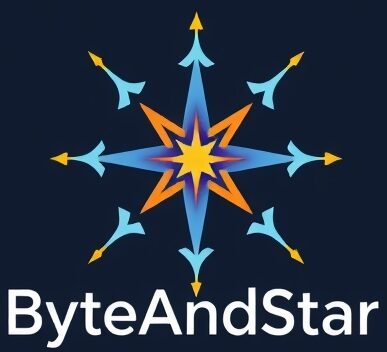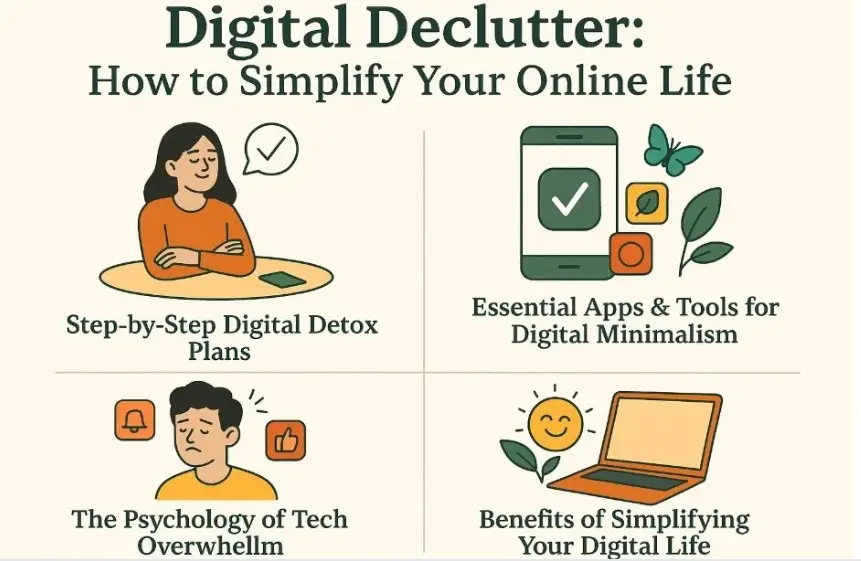In today’s nonstop digital world, our devices buzz relentlessly—emails flood in, social media never sleeps, and that endless stream of notifications can make you feel drained. If you’ve ever felt overwhelmed or exhausted by your online life, you’re not alone. 😩 I’ve been there too, and this is how I embraced a digital declutter to find calm, focus, and balance.
The Problem & The Promise: Why a Digital Declutter Matters 🌀
A few years ago, I realized I was constantly “plugged in” — checking my phone first thing in the morning, distracted at dinner, and unable to switch off at night. This constant connection created screen fatigue, stress, and made me feel like I had no time to breathe.
That’s where digital declutter changed everything. It’s about intentionally clearing away digital noise so you can focus on what truly matters—your work, relationships, and well-being. Imagine reclaiming your time, reducing stress, and enjoying evenings free from mindless scrolling. That promise is powerful. 😌
Step-by-Step Digital Detox Plans: Practical Steps to Simplify 🚶♀️📵
You don’t need to overhaul your life overnight. Try these digital declutter steps tailored to fit your lifestyle:
Daily Habits to Ease In
No-phone-in-bedroom rule: Charge your phone outside your bedroom for better sleep and less temptation.
Email & social media windows: Limit checking to specific times, like mid-morning and late afternoon.
Use ‘Do Not Disturb’: Silence notifications during meals, family time, or focused work periods.
Weekly Mini Challenges
Offline day: Pick one day to unplug from social media and non-essential screens.
Focus blocks: Schedule 90-minute distraction-free work sessions with a timer.
Monthly Deep Cleans
Weekend digital sabbatical: Commit to a full weekend offline for real rest.
App purge: Delete apps you rarely use and notice how light your phone feels.
Tips for Success: Tackling FOMO & Building New Habits 💪
The hardest hurdle is often FOMO—fear of missing out. But here’s how to win the battle in your digital declutter:
Set expectations: Tell friends and colleagues about your offline plans so they know how to reach you if needed.
Find replacements: Swap “phone time” for reading, walks, or meditation.
Celebrate progress: Reward yourself for sticking to your declutter goals.
Remember, it’s a marathon, not a sprint. Small, steady steps lead to lasting change.
Apps & Tools That Support Digital Declutter 📱✨
Technology can help you declutter itself! Here are my favorite apps for staying on track:
Forest 🌳
Grow a virtual tree by staying off your phone. Leave the app and your tree wilts—fun motivation for focus!
Freedom 🚫
Block distracting sites and apps across devices to reclaim your attention.
Unroll.Me 📧
Easily unsubscribe from unwanted emails and consolidate your subscriptions.
Google Keep / Evernote 🗂️
Organize notes and ideas in one place to clear your digital workspace.
Built-in Screen Time ⏳
Track your app usage and set daily limits to keep habits in check.
Why Tech Overwhelm Happens: The Psychology Behind It 🤯
Understanding why you feel overwhelmed is key to effective digital declutter:
Information overload: Too much data floods your brain.
Decision fatigue: Constant choices drain your mental energy.
FOMO: Social media triggers anxiety about missing out.
Dopamine loops: Apps are designed to keep you hooked with rewards.
Knowing this helps you regain control and build healthier habits.
Start Your Digital Declutter Journey Today! 🚀
ry this simple 7-day plan:
Days 1-2: No phones in the bedroom
Days 3-4: Limit email and social media checks
Day 5: Use a distraction blocker for focused time
Day 6: Delete unused apps
Day 7: Unplug for several hours or a full offline block
Share your digital declutter wins or tips below! 👇 Let’s simplify life together.
Recommended Resources 📚
Simplify, focus, and reclaim your time with digital declutter. Your peaceful digital life awaits. 🌟.
Digital declutter means intentionally reducing digital distractions—like notifications, apps, and emails—to create a simpler, more balanced online experience.
Begin with small daily habits such as no phones in the bedroom, scheduled social media checks, and gradually move to offline days or app purges.
It helps reduce screen fatigue, decision fatigue, and stress, allowing for better focus, improved mental health, and more quality offline time.
Popular tools include Forest (focus timer), Freedom (site blocker), Unroll.Me (email cleaner), and built-in Screen Time features.


I don’t think the title of your article matches the content lol. Just kidding, mainly because I had some doubts after reading the article. https://accounts.binance.com/ru-UA/register-person?ref=JVDCDCK4
Thank you for your comment, you scared me first however if you need any other information/ query related to the blog I will try me best to resolve it.